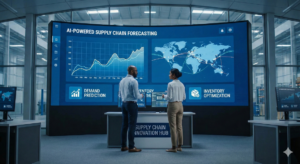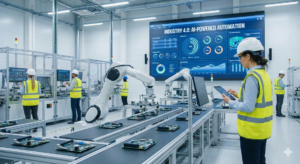How Artificial Intelligence Is Changing the Way Decisions Are Made in Human Resources and Recruitment

How Artificial Intelligence Is Changing the Way Decisions Are Made in Human Resources and Recruitment
Human Resources (HR) has always played a pivotal part in the way that firms recruit, retain, and manage their employees. Even yet, inefficiencies are a common problem for conventional human resources processes. These inefficiencies include the fact that recruiting cycles are sometimes time-consuming, that decisions are sometimes made with unconscious prejudice, and that it is impossible to anticipate how successful an employee will be. The human resources (HR) environment is undergoing a transformation as a result of the introduction of artificial intelligence (AI). AI is bringing out more intelligent technologies that make the process of recruiting more efficient, enhance how employees are managed, and deliver data-driven insights for more informed decision-making.
1. Artificial Intelligence’s Increasing Significance in Human Resources
For many years, the human resources department was largely responsible for handling administrative tasks. Although the digital age brought about a transition that resulted in more strategic operations, inefficiencies persisted. Artificial intelligence is now able to automate monotonous jobs and provide predictive insights, bringing a new degree of intelligence to human resources. As a result, human resources professionals are able to devote their attention to activities that are of great value, such as employee engagement, leadership development, and the culture of the firm.
2. Automating the Process of Finding Candidates
In a matter of seconds, recruiting systems that are driven by artificial intelligence are able to sift through thousands of resumes, job boards, and professional networking websites. Artificial intelligence (AI) can screen candidates based on their credentials, experience, and talents, which ensures that only the applicants who are most relevant will advance in the process. This allows recruiters to avoid wasting hours of their time combing through applications. This automation decreases the amount of time it takes to employ someone and makes it more likely that the best person for the job will be found.
3. More Intelligent Resume Screening
Because of mismatches in keywords or tiredness on the part of the recruiter, great applicants are often overlooked during the traditional resume screening process. Natural language processing (NLP) is used by systems that are powered by artificial intelligence (AI) to comprehend resumes within their context, which allows them to discover transferable abilities and hidden talents. For instance, an artificial intelligence model is better capable of identifying the abilities that are required for sales positions in a candidate who has prior expertise in customer service than a human reviewer doing a manual review.
4. Minimizing Bias in the Hiring Process
In the field of recruiting, unconscious prejudice has been a source of worry for a long time. Artificial intelligence (AI) has the ability to make judgments about employment more objective by concentrating on abilities and performance indicators instead of taking gender, age, or race into consideration. Artificial intelligence can be designed to decrease human subjectivity when it is applied responsibly, resulting in more equitable and inclusive employment processes. This is because no system is completely free from prejudice, but AI can be designed to minimize human subjectivity when it is deployed properly.
5. Chatbots that are powered by artificial intelligence to increase candidate engagement
Candidates may feel that they are being overlooked or devalued by recruitment processes that are plagued by poor communication. These days, artificial intelligence chatbots are responsible for handling the normal contacts with candidates, offering answers to frequently asked questions, organizing interviews, and giving information on the progress of applications. This ensures that communication is consistent, enhances the applicant experience, and decreases the amount of paperwork that human resources professionals have to deal with.
6. Using Predictive Analytics to Ensure Hiring Success
Predictive analytics is one of the most transformational features of artificial intelligence (AI) in human resources (HR). Artificial intelligence (AI) may assist in the prediction of which applicants are most likely to succeed in certain jobs by studying previous employee performance. This predictive capacity enables businesses to make more educated recruiting choices, which reduces employee turnover rates and improves the long-term stability of their staff.
7. Employee Engagement and Retention
Artificial intelligence doesn’t just play a part in the recruiting process, but also in the retention of employees. Artificial intelligence (AI) techniques are able to identify early warning indications of burnout or disengagement by evaluating data obtained from performance assessments, interactions in the workplace, and surveys. In order to increase work satisfaction and decrease turnover, human resources departments may then take proactive actions, such as providing wellness programs, training, or flexible hours.
8. Customization of Learning and Development
Learning and development programs may be personalized to meet the needs of each individual employee by using artificial intelligence. Rather of being given generic training programs, workers are provided with suggestions that are tailored to their own skill sets, professional ambitions, and performance gaps. Not only does this individualized kind of training improve employee development, but it also guarantees that businesses will acquire the appropriate abilities in order to fulfill future business requirements.
9. Planning and Decision-Making in the Workforce
In order to assist human resources professionals in strategic workforce planning, artificial intelligence (AI) analyzes patterns in employee performance, employee turnover, and market circumstances. whether it comes to deciding whether to bring on new employees, which responsibilities to prioritize, and how to make the most of available resources, these observations are helpful. This data-driven approach to making decisions guarantees that the human resources department is in accordance with the organization’s long-term objectives.
10. Considerations of Ethics and Privacy
Artificial intelligence (AI) in human resources (HR) presents moral dilemmas, even if there are benefits to be gained from it. The data that is collected from candidates is sensitive in nature, and the inappropriate use of this data might be a breach of privacy laws. Furthermore, if artificial intelligence (AI) systems get their training from datasets that are biased, it is possible that they would unintentionally perpetuate inequality rather than eradicate it. When it comes to the deployment of responsible AI, it is necessary to maintain openness, conduct audits on a regular basis, and diligently comply with data protection requirements.
11. Difficulties Encountered During Implementation
When organizations decide to use artificial intelligence in their human resources departments, they often encounter challenges such as high installation costs, integration with current human resources systems, and opposition from employees who are not yet comfortable with AI capabilities. In order to guarantee that AI is used successfully, it is essential to train human resources professionals to comprehend and analyze artificial intelligence (AI) findings.
12. The Future of Artificial Intelligence in HR
In the future, artificial intelligence (AI) has the potential to become a reliable source of guidance for human resources departments. It is possible that future systems would not only evaluate the talents of employees but will also take into consideration factors such as cultural fit, team chemistry, and leadership potential. In the future, when combined with improvements in natural language comprehension, artificial intelligence could be able to carry out preliminary interviews or give real-time coaching for managers who are making choices about human resources.
By automating activities that are considered normal, enhancing the experiences of job applicants, minimizing prejudice, and offering predictive insights that facilitate improved decision-making, artificial intelligence is revolutionizing the field of human resources and recruiting. The advantages provided by human resources that are powered by artificial intelligence are too substantial to disregard, despite the fact that obstacles like as ethics, data protection, and integration continue to exist. When firms combine the analytical capabilities of artificial intelligence with the human traits of empathy and judgment, they have the opportunity to develop workforces that are more engaged, stronger, and fairer.




